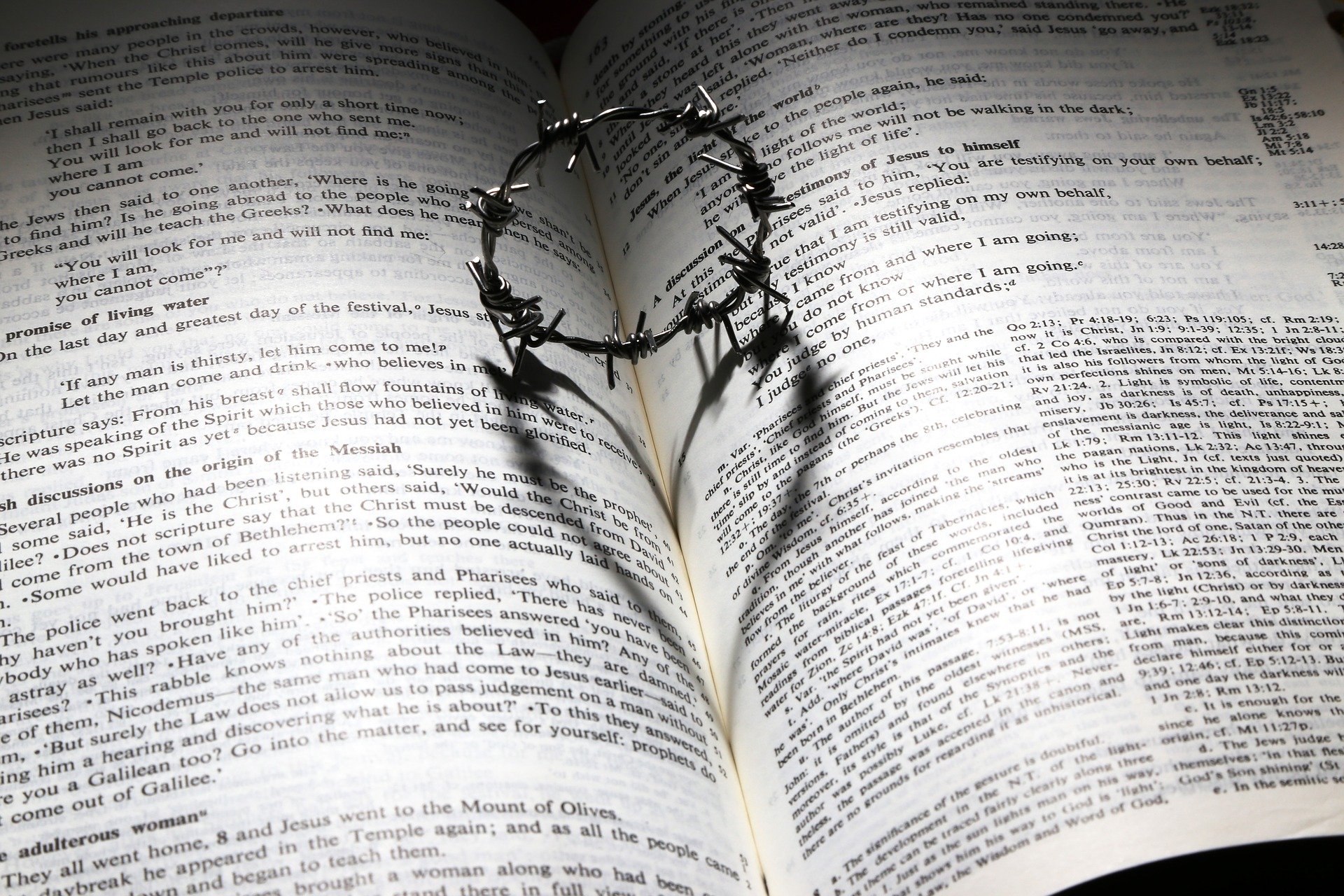
“The law is only a shadow of the good things that are coming—not the realities themselves. For this reason it can never, by the same sacrifices repeated endlessly year after year, make perfect those who draw near to worship. 2 Otherwise, would they not have stopped being offered? For the worshipers would have been cleansed once for all, and would no longer have felt guilty for their sins. 3 But those sacrifices are an annual reminder of sins. 4 It is impossible for the blood of bulls and goats to take away sins.
5 Therefore, when Christ came into the world, he said:
“Sacrifice and offering you did not desire,
but a body you prepared for me;
6 with burnt offerings and sin offerings
you were not pleased.
7 Then I said, ‘Here I am—it is written about me in the scroll—
I have come to do your will, my God.’”[a]
8 First he said, “Sacrifices and offerings, burnt offerings and sin offerings you did not desire, nor were you pleased with them”—though they were offered in accordance with the law. 9 Then he said, “Here I am, I have come to do your will.” He sets aside the first to establish the second. 10 And by that will, we have been made holy through the sacrifice of the body of Jesus Christ once for all.
Perfect Sacrifice
I love the analogy of the sick man who took some medicine that was prescribed to him by his doctor. If that medicine made him better, every time he looked at the bottle, he would say, “That is what gave me back my health.” On the other hand, if the medicine was ineffective, every time he looked at the bottle, he would be reminded that he was still sick and the medicine was useless.
So it is with the sacrificial system. The writer to the Hebrews reminds us that the sacrifice of animals is powerless to purify a man of his sins and give him access to God. All the sacrifices can do is remind the man of his sin and that his sin is a barrier to his relationship with God. Instead of removing his sin, it highlights it.
The only effective sacrifice is that of Jesus Christ. The writer of Hebrews says the law is a pale shadow of the blessings that are to come and not a real image of these things. A pale shadow cannot give a clear representation or visual, it is just a silhouette, or a form without reality. He says they do not give a real image. Without Christ, we see only shadows of reality. Christ brings us beyond the shadows of God.
Obedience is Better Than Sacrifice
The psalmist understood that God was looking for more than ritual sacrifices, he was looking for obedience. He was looking for a heart to follow him, heed his instructions, and worship Him through surrender and obedience.
“Sacrifice and offering You did not desire, but my ears You have opened. Burnt offerings and sin offerings You did not require. Then I said, “Here I am, I have come—it is written about me in the scroll: I delight to do Your will, O my God; Your law is within my heart.” Psalm 40:6
The psalmist is saying, God wanted not animal sacrifice, but obedience to His will. Sacrifice meant taking something that was dear to and belonged to a man and giving it to God to show his love. But over time, sacrifice became about works and “buying” God’s forgiveness.
The only true sacrifice God is looking for is obedience. A surrender of our wills to His. William Barclay states, “Nothing but obedience could open the way to God; disobedience set up a barrier that no animal sacrifice could ever take away. Jesus was the perfect sacrifice because He perfectly did God’s will.”
In the Garden of Gethsemane, Jesus brought His entire will before His Father and said, “Do with me as you will.” He was the perfect sacrifice because He brought to God what no man had been able to bring, the perfect obedience, and that was the perfect sacrifice. Where Adam and Eve could not have brought perfect obedience, Jesus did. Jesus showed us what sacrifice looks like. It looks like obedience to the Father. God calls us to be living sacrifices. We are to follow the example of Jesus in surrendering our lives as living sacrifices through obedience.
To have relationship with God, there must be obedience. What man could not offer, Jesus offered. Man has failed miserably at obedience, but Jesus obeyed perfectly. Lest we say Jesus obeyed easily because He was God, we should not forget that Jesus was completely man as well. In His perfect manhood He offered the perfect sacrifice of the perfect obedience.
Now the way has been opened up once and for all for all of us. No longer do we look at obedience as legalism when we realize the sacrifice Jesus made for us. We now obey, not to earn our salvation or God’s love, we obey because we already have His love and our salvation has already been bought at a high price.
When I understand the great love of a Father who would go to such lengths to give His only son as a perfect sacrifice in my place, I need not worry about legalism, and what is acceptable and what is not, because my heart longs to please my heavenly Father. If He has said a thing is not good, then I should want to listen and obey.
You see, the more I know Jesus, the more I know His love and the more my love grows for Him. Sin, or disobeying Him, would be a trampling of what He did for me. “It is not mere rebelliousness against law; it is the wounding of love” (William Barclay, 125).
Sin, or disobedience, is also the failure to see the sacredness of sacred things. When we look at what has been done for us, and we see the shed blood and the broken body of Christ, and we realize what our new relationship with God cost, can we really treat sin as though it did not matter? Sin is the failure to realize the sacredness of that sacrifice upon the cross.
Sin is also an insult to the Holy Spirit. The Holy Spirit speaks to us, telling us what is right and wrong. The Holy Spirit sends “checks” in our spirit when we are about to sin and keeps us from falling into apathy. If we disregard the voice of the Holy Spirit, it is an insult to Him and it grieves the heart of God. “Sin is not disobedience to an impersonal law; it is the wrecking of a personal relationship and the wounding of the heart of the God whose name is Father” (William Barclay, 125).
Bruce Wilkerson describes it beautifully when he says, “The law is not intended for the person whose obedience springs out of a desire to please God. He is not concerned about what is legal or illegal, what is permitted or forbidden. He has only one criterion, what does my Lord desire. You can lay all the law before him, all the rules, regulations and prohibitions and he will say, ‘You don’t have to tell me not to do those things. I wouldn’t do anything to hurt my Father. I love Him. I’ve already forsaken the world and all its lust to go after Him whom my heart desires. Show me what He wants, not just what He forbids. I want His heart’s desire to become my actions. I want to know His mind and obey it. Sure, I love His law, but that’s for the lawless, for those who haven’t come into a knowledge of intimacy with Christ.’ I have another law at work in my heart. It’s the law of love. One that says, ‘Lord what can I do to please you today.’”
Works Cited
Barclay, William. “The Letter to the Hebrews.” The Westminster Press. Philadelphia. 1976.


